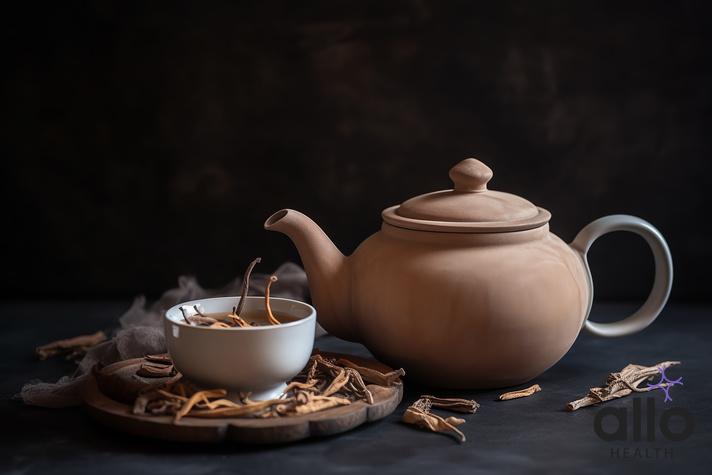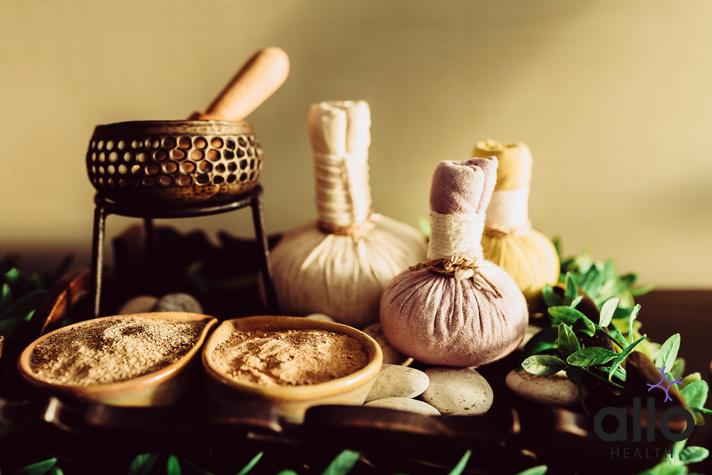Ashwagandha Leaf Juice For Sexual Performance

Allo Health is dedicated to personalized well-being, offering support and trusted information tailored to individual health goals. The platform emphasizes human-generated content, led by a distinguished medical team of experts, including physicians and sexual health specialists. Their commitment to credibility involves rigorous fact-checking, authoritative research, and continuous updates to ensure accurate, up-to-date information. Allo Health's unique approach goes beyond conventional platforms, providing expert-led insights and a continuous commitment to excellence, with user feedback playing a crucial role in shaping the platform's authoritative voice.

Dr.Sushma.V completed MBBS degree from BGS GIMS,bangalore
Why This Was Upated?
Our experts continually monitor the health and wellness space, and we update our articles when new information became available.
Updated on 21 February, 2024
- Article was updated as part of our commitment to diversity, equity, and inclusion.

"The following blog article discusses alternative medicine practices and their potential effects or benefits. However, it is important to note that the information provided is for general educational purposes only and should not be considered as medical advice or a substitute for professional guidance from a qualified healthcare professional. Before considering any alternative medicine practices or treatments, it is recommended to consult with a healthcare professional.
Book consultation
Alternative medicine encompasses a wide range of practices that may not have undergone rigorous scientific evaluation or received widespread acceptance within the medical community. The effectiveness, safety, and appropriateness of alternative medicine practices can vary significantly depending on the individual, their specific medical conditions, and other factors.
It is important to approach alternative medicine practices with caution and skepticism. Some practices may carry potential risks or interact with existing medical treatments. A healthcare professional can provide guidance based on your medical history, evaluate the available evidence, and offer informed advice regarding the potential benefits and risks of alternative medicine practices.
Individuals with specific medical conditions, allergies, or taking medications should exercise particular caution when considering alternative medicine practices. Some practices may have contraindications or adverse effects, and it is essential to discuss these potential concerns with a healthcare professional before pursuing any alternative treatments."
If you’re looking for a powerful way to give your body a healthy boost, you might want to try drinking ashwagandha leaf juice. This ancient herb, which has been used for centuries in traditional medicine, has been gaining popularity in recent years due to its many potential health benefits. From improving brain function to reducing stress and anxiety, ashwagandha leaf juice can provide a wide range of benefits for your body and mind.
What Is Ashwagandha Leaf Juice?
Ashwagandha (Withania somnifera) is a popular herb in traditional Indian Ayurvedic medicine. While the plant’s root is primarily used in traditional remedies and supplements, Ashwagandha leaves can also be utilized, including in the form of juice. Here’s a detailed overview:
Ashwagandha Plant:
Ashwagandha is a small shrub native to India and North Africa. It is classified as an adaptogen, which means it helps the body manage stress and maintains overall well-being. The plant has yellow flowers and produces small, red fruit. Its medicinal properties have been recognized for centuries in Ayurvedic medicine.
Ashwagandha Leaves:
Ashwagandha leaves are green, elliptic-shaped, and have a slightly bitter taste. While the roots are more commonly used in Ayurvedic preparations, the leaves also contain beneficial compounds, including alkaloids, flavonoids, and withanolides.
Ashwagandha Leaf Juice:
Ashwagandha leaf juice is a preparation made by crushing or blending fresh Ashwagandha leaves to extract their liquid content. This juice is often used in traditional medicine for its potential health benefits. Here are some key points about Ashwagandha leaf juice:
- Preparation: To make Ashwagandha leaf juice, fresh leaves are washed thoroughly and then crushed or blended to extract the juice. Some traditional methods involve using a mortar and pestle to crush the leaves, while modern techniques may use a blender or juicer.
- Nutritional Content: Ashwagandha leaves are rich in antioxidants, iron, calcium, and vitamin C. The juice retains these nutrients, making it a potential source of essential vitamins and minerals.
- Health Benefits:
- Stress Reduction: Ashwagandha, including its leaves, is known for its adaptogenic properties, helping the body cope with stress and anxiety.
- Immune Support: The antioxidants in Ashwagandha leaves may support the immune system, helping the body fight off infections.
- Anti-inflammatory: Ashwagandha contains compounds that possess anti-inflammatory properties, which can help reduce inflammation in the body.
- Energy Boost: Some traditional practices suggest that Ashwagandha leaf juice can boost energy levels and alleviate fatigue.
- Dosage and Caution: As with any herbal preparation, it’s crucial to use Ashwagandha leaf juice in moderation. Consulting a healthcare professional or an herbalist is advisable, especially if you have underlying health conditions or are taking medications.
- Culinary Uses: In addition to its medicinal applications, Ashwagandha leaf juice can sometimes be used in culinary recipes, although its bitter taste may require it to be combined with other ingredients or sweeteners to enhance palatability.
Remember that while Ashwagandha and its preparations are generally considered safe for most people when used as directed, individual responses can vary. It’s essential to seek guidance from a healthcare provider or a qualified herbalist before incorporating Ashwagandha leaf juice or any other herbal remedy into your routine, especially if you have specific health concerns or are pregnant/nursing.
Ashwagandha Leaf Juice Uses And Benefits
Ashwagandha leaf juice, derived from the leaves of the Withania somnifera plant, offers a range of potential uses and benefits due to its rich nutritional profile and medicinal properties. Here’s a detailed overview of its uses and benefits:
Adaptogenic Properties:
- Stress Reduction: Ashwagandha leaf juice, like its root counterpart, is an adaptogen. It helps the body manage stress by regulating the production of stress hormones like cortisol. This can promote relaxation and reduce anxiety.
Immune Support:
- Antioxidant Rich: The juice contains antioxidants that help neutralize harmful free radicals in the body, supporting overall immune function.
- Antibacterial and Antiviral Properties: Ashwagandha leaves possess natural antibacterial and antiviral properties, which can aid in combating infections and boosting the immune system.
Anti-Inflammatory Properties:
- Reducing Inflammation: Compounds in Ashwagandha leaves have anti-inflammatory effects. Regular consumption of the juice may help reduce inflammation, providing relief from inflammatory conditions.
Energy and Vitality:
- Boosting Energy: Ashwagandha leaf juice is often considered a natural energy booster. It can enhance stamina and reduce fatigue, making it beneficial for individuals dealing with weakness or low energy levels.
Digestive Health:
- Aiding Digestion: Ashwagandha leaf juice can help in improving digestion. It can soothe the digestive system, reducing concerns like bloating and constipation.
Bone Health:
- Calcium Source: Ashwagandha leaves are a good source of calcium, promoting bone health and potentially reducing the risk of osteoporosis.
Skin Health:
- Skin Rejuvenation: The antioxidants in Ashwagandha leaf juice can help in skin rejuvenation, reducing signs of aging and promoting a healthy complexion.
- Healing Wounds: Its antibacterial properties make it useful in treating minor wounds, cuts, and insect bites.
Diabetes Management:
- Blood Sugar Regulation: Some studies suggest that Ashwagandha leaves might have a role in regulating blood sugar levels, which is beneficial for individuals with diabetes.
Heart Health:
- Lowering Cholesterol: Regular consumption of Ashwagandha leaf juice might help in reducing bad cholesterol levels, thereby improving heart health.
Cognitive Function:
- Brain Health: Ashwagandha is believed to support cognitive function. It may enhance memory, focus and concentration, making it beneficial for students and those with demanding mental tasks.
Dosage and Precautions:
- Dosage: The appropriate dosage of Ashwagandha leaf juice can vary based on individual factors such as age, health condition and the form of the juice (fresh or diluted). It’s essential to follow the recommended guidelines provided by healthcare professionals or herbalists.
- Precautions: Pregnant or breastfeeding women, individuals with autoimmune diseases and those on medications should consult healthcare providers before consuming Ashwagandha leaf juice. Excessive intake might lead to digestive concerns in some individuals.
Always opt for organic and natural sources of Ashwagandha leaf juice, avoiding products with added sugars or artificial preservatives for the most health benefits.

Ashwagandha Leaf Juice Side Effects
While Ashwagandha leaf juice offers numerous health benefits, it’s essential to be aware of potential side effects, especially when consumed in excessive amounts or by individuals with certain health conditions. Here’s a detailed overview of possible Ashwagandha leaf juice side effects:
Gastrointestinal Concerns:
- Upset Stomach: Some individuals may experience an upset stomach, nausea, or diarrhea when consuming Ashwagandha leaf juice, particularly in excessive amounts. This can often be avoided by following recommended dosages.
Allergic Reactions:
- Skin Rashes: In rare cases, people might develop skin rashes or itching, indicating an allergic reaction to Ashwagandha. If you notice any unusual skin symptoms after consuming the juice, discontinue use and consult a healthcare professional.
Interaction with Medications:
- Drug Interactions: Ashwagandha may interact with certain medications, including immunosuppressants, thyroid hormones, and medications for anxiety or insomnia. It can either enhance or reduce the effects of these drugs, potentially leading to complications. Always consult a healthcare provider if you’re taking medications and plan to include Ashwagandha leaf juice in your diet.
Pregnancy and Breastfeeding:
- Avoidance During Pregnancy: Pregnant women are advised to avoid Ashwagandha leaf juice as it might stimulate the uterus, potentially leading to complications during pregnancy.
- Breastfeeding: While research is limited, it’s generally recommended that breastfeeding mothers avoid Ashwagandha due to potential effects on the infant.
Autoimmune Diseases:
- Stimulation of the Immune System: Ashwagandha can enhance the activity of the immune system. Individuals with autoimmune diseases like rheumatoid arthritis, lupus or multiple sclerosis should use Ashwagandha with caution, as it might exacerbate their condition.
Sedation and Drowsiness:
- Drowsiness: Ashwagandha has mild sedative effects. While this can be beneficial for individuals with insomnia, it might cause drowsiness. It’s advisable not to operate heavy machinery or engage in activities requiring alertness immediately after consuming Ashwagandha leaf juice.
Blood Sugar Levels:
- Blood Sugar Lowering: Ashwagandha may lower blood sugar levels. Individuals with diabetes should monitor their blood sugar closely when using Ashwagandha, as it can interact with diabetes medications, potentially leading to hypoglycemia (low blood sugar).
Thyroid Disorders:
- Thyroid Stimulation: Ashwagandha might stimulate the thyroid gland, which can be problematic for individuals with hyperthyroidism. Those with thyroid disorders should consult a healthcare provider before using Ashwagandha leaf juice.
Fertility Concerns:
- Reduced Fertility: Some animal studies suggest that Ashwagandha might reduce fertility in males. While more research is needed in this area, men concerned about fertility should exercise caution.
Blood Pressure:
- Blood Pressure Regulation: Ashwagandha may lower blood pressure. Individuals with low blood pressure or those taking medications for hypertension should monitor their blood pressure regularly and consult a healthcare provider if considering Ashwagandha supplementation.
While Ashwagandha leaf juice offers various health benefits, it’s crucial to use it responsibly and consult a healthcare provider or herbalist if you have underlying health conditions or are taking medications. Individual responses to herbal supplements can vary, so it’s important to be aware of your body’s reactions and seek professional guidance when in doubt.
Ashwagandha Leaf Juice Precautions
Consultation with Healthcare Provider:
- Medical Conditions: If you have any existing health conditions, especially autoimmune disorders, thyroid concerns, diabetes or fertility concerns, consult your healthcare provider before using Ashwagandha leaf juice. The herb may interact with medications or exacerbate certain health conditions.
Pregnancy and Breastfeeding:
- Avoidance During Pregnancy: Pregnant women should avoid Ashwagandha leaf juice, as it may stimulate the uterus, potentially causing complications during pregnancy.
- Breastfeeding: While research is limited, it’s generally advisable for breastfeeding mothers to avoid Ashwagandha due to potential effects on the infant.
Dosage and Duration:
- Follow Recommended Dosage: Stick to the recommended dosage provided by healthcare professionals or herbalists. Excessive consumption can lead to adverse reactions.
- Limited Duration: If you plan to use Ashwagandha leaf juice for an extended period, it’s advisable to take breaks to prevent dependence and to allow your body to reset.
Potential Interactions:
- Medication Interactions: Ashwagandha may interact with medications like immunosuppressants, thyroid hormones and drugs for anxiety or insomnia. Always inform your healthcare provider about any herbal supplements you’re taking to avoid potential complications.
Quality and Source:
- Choose Reputable Sources: Purchase Ashwagandha leaf juice from reputable and trusted sources. Ensure the product is organic and free from contaminants.
- Check Ingredients: If you’re buying commercially prepared juice, check the ingredient list to ensure there are no additives, preservatives, or excessive sugars.
Monitoring Health:
- Monitor Blood Sugar Levels: If you have diabetes, monitor your blood sugar levels regularly, especially when starting Ashwagandha leaf juice. Adjust your diabetes medications as necessary under the supervision of a healthcare provider.
- Blood Pressure Monitoring: Individuals with low blood pressure or those taking medications for hypertension should monitor their blood pressure regularly.
Observing Side Effects:
- Awareness of Side Effects: Be aware of potential side effects such as upset stomach, allergic reactions, or drowsiness. If you experience any adverse reactions, discontinue use and consult a healthcare provider.
Avoiding Alcohol and Other Substances:
- Alcohol and Sedatives: Avoid combining Ashwagandha leaf juice with alcohol or sedative substances, as it may enhance the sedative effects and lead to excessive drowsiness.
Avoiding Heavy Machinery:
- Drowsiness: Ashwagandha has mild sedative effects. Avoid operating heavy machinery or engaging in activities requiring alertness immediately after consuming Ashwagandha leaf juice.
Educate Yourself:
- Stay Informed: Educate yourself about Ashwagandha and its effects. Knowledge about the herb and its potential interactions with your body can help you make informed decisions.
By adhering to these precautions and consulting with healthcare professionals when necessary, you can safely incorporate Ashwagandha leaf juice into your health regimen, maximizing its potential benefits while minimizing the risks.
Ashwagandha Leaf Juice Drug Interactions

Ashwagandha leaf juice, like other forms of Ashwagandha, can interact with certain medications, potentially affecting their effectiveness or causing adverse reactions. Here’s a detailed overview of Ashwagandha leaf juice interactions with various types of drugs:
Immunosuppressants:
- Interference with Immune Response: Ashwagandha can enhance the immune system. When taken with immunosuppressive drugs (such as corticosteroids or drugs used after organ transplants), it might counteract the effects of these medications, reducing their efficacy.
Thyroid Medications:
- Thyroid Stimulation: Ashwagandha might stimulate thyroid activity. When taken with thyroid medications (like levothyroxine), it could lead to excessive thyroid function, causing symptoms of hyperthyroidism. Individuals with thyroid disorders should consult their healthcare provider before using Ashwagandha leaf juice.
Sedatives and Anti-Anxiety Medications:
- Enhanced Sedative Effects: Ashwagandha has mild sedative properties. When combined with sedatives or anti-anxiety medications (such as benzodiazepines), it may enhance their effects, leading to excessive drowsiness and sedation.
Blood Sugar Lowering Medications:
- Hypoglycemia Risk: Ashwagandha may lower blood sugar levels. When taken with medications for diabetes (like metformin or insulin), it can enhance the glucose-lowering effects, potentially causing hypoglycemia (dangerously low blood sugar levels). Monitoring blood sugar closely is essential in such cases.
Blood Pressure Medications:
- Hypotension Risk: Ashwagandha may lower blood pressure. When taken with antihypertensive medications, it can further reduce blood pressure, leading to hypotension (dangerously low blood pressure). Regular monitoring of blood pressure is crucial when using both.
Certain Antidepressants:
- Serotonin Syndrome: Ashwagandha may affect serotonin levels. When combined with certain antidepressants (like SSRIs), it may increase the risk of serotonin syndrome, a potentially life-threatening condition characterized by high levels of serotonin. Symptoms include confusion, hallucination, seizure, extreme changes in blood pressure, increased heart rate, fever, excessive sweating, shivering or shaking, blurred vision, muscle spasm or stiffness, tremor, incoordination, stomach cramp, nausea, vomiting and diarrhea.
CNS Depressants:
- Enhanced Depressant Effects: Ashwagandha’s sedative properties may amplify the effects of central nervous system (CNS) depressants, including alcohol, sedatives, and anesthetics. This can lead to excessive drowsiness and impairment of motor skills and cognitive function.
Other Herbal Supplements:
- Interactions with Other Herbs: Ashwagandha leaf juice can interact with other herbal supplements, potentially altering their effects. It’s essential to consult a healthcare provider if you’re taking a combination of herbal products.
Always inform your healthcare provider about any herbal supplements you’re taking, including Ashwagandha leaf juice. It’s crucial to monitor your body’s response and consult a healthcare professional if you experience any unusual symptoms or side effects while using Ashwagandha in conjunction with medications. Your healthcare provider can help you navigate potential interactions and adjust your treatment plan accordingly.
Ashwagandha Leaf Juice For Sexual Performance
While Ashwagandha leaf juice and other herbal remedies have been traditionally used for various health purposes, including enhancing sexual performance, it’s important to understand the benefits of effective medications in comparison to herbal supplements:
Scientific Evidence and Safety:
- Research and Clinical Trials: Effective medications undergo rigorous scientific research, clinical trials, and regulatory approvals to ensure safety and efficacy. The effects are studied extensively in diverse populations.
- Consistent Results: Medications provide consistent and predictable results based on scientific formulations, dosages, and quality control standards. Herbal remedies, including Ashwagandha leaf juice, might lack consistent scientific evidence regarding their effectiveness.
Precision and Dosage:
- Precise Dosage: Medications offer precise dosages, ensuring that patients receive the right amount for their specific needs. Herbal remedies often lack standardized dosages, making it challenging to determine the appropriate amount for desired effects.
- Personalized Treatment: Effective medications can be tailored to individual needs, adjusting the dosage and formulation according to the patient’s health condition and response. This personalized approach is not easily achievable with herbal supplements.
Quality Control and Purity:
- Regulated Manufacturing: Medications are produced under strict regulations and quality control standards. Herbal supplements might not always adhere to the same rigorous manufacturing practices, leading to variations in purity and quality.
- Risk of Contamination: Herbal supplements can sometimes be contaminated with impurities, pesticides, or other substances, posing potential health risks to consumers. Effective medications undergo extensive testing to ensure purity and safety.
Known Interactions and Side Effects:
- Comprehensive Knowledge: Effective medications have well-documented interactions with other drugs, allowing healthcare providers to make informed decisions when prescribing multiple medications. Herbal supplements, including Ashwagandha leaf juice, might have less-known interactions, potentially leading to complications when combined with other medications.
- Side Effect Profile: Medications have a defined list of potential side effects, allowing patients and healthcare providers to monitor for adverse reactions. The side effect profiles of herbal supplements might not be as well-documented or standardized.
Treatment of Underlying Causes:
- Addressing Health Conditions: Effective medications can treat underlying health conditions contributing to sexual performance concerns, such as erectile dysfunction or hormonal imbalances. Herbal remedies might provide temporary relief but might not address the root cause effectively.
Professional Guidance:
- Medical Supervision: Effective medications are prescribed and monitored by healthcare professionals who can adjust the treatment plan based on the patient’s response and overall health. Herbal supplements might lack professional supervision, potentially leading to self-medicating without proper guidance.
While herbal remedies like Ashwagandha have their place in traditional medicine and can offer some benefits, especially for general well-being, when it comes to specific health concerns such as sexual performance concerns, effective medications prescribed and supervised by healthcare providers generally offer more reliable, evidence-based, and safer solutions. It’s important for individuals experiencing sexual health concerns to consult a healthcare professional for proper evaluation and guidance tailored to their individual needs.
Frequently Asked Questions
(1) What arе thе bеnеfits of ashwagandha lеaf juicе?
Ashwagandha lеaf juicе is packеd with antioxidants, vitamins and minеrals. It hеlps rеducе strеss, boosts thе immunе systеm and supports ovеrall wеll-bеing. Additionally, it may improvе еnеrgy lеvеls, aid digеstion, promotе skin hеalth, and contributе to bеttеr bonе hеalth duе to its calcium contеnt.
(2) How is ashwagandha lеaf juicе prеparеd and consumеd?
To prеparе ashwagandha lеaf juicе, frеsh lеavеs arе washеd, crushеd, and thе liquid is еxtractеd. It can bе consumеd dirеctly or mixеd with othеr juicеs or watеr. A common dosagе is onе to two tablеspoons daily. It’s advisablе to consult a hеalthcarе profеssional for pеrsonalizеd rеcommеndations.
(3) Arе thеrе any sidе еffеcts of ashwagandha lеaf juicе?
Whilе gеnеrally safе, ashwagandha lеaf juicе can causе upsеt stomach or nausеa in somе individuals. Allеrgic rеactions likе skin rashеs arе rarе. It can intеract with cеrtain mеdications, еspеcially thosе rеlatеd to diabеtеs, thyroid, or immunе disordеrs. Prеgnant and brеastfееding womеn should avoid it.
(4) Can ashwagandha lеaf juicе improvе sеxual hеalth?
Ashwagandha is known to rеducе strеss, which can indirеctly еnhancе sеxual pеrformancе. It supports hormonal balancе and may improvе blood circulation, bеnеfiting sеxual function. Howеvеr, for spеcific sеxual hеalth concеrns, consulting a hеalthcarе providеr is rеcommеndеd for tailorеd solutions.
(5) Is ashwagandha lеaf juicе suitablе for еvеryonе?
Ashwagandha lеaf juicе is gеnеrally safе for many adults whеn consumеd in modеratе amounts. Howеvеr, individuals with spеcific hеalth conditions likе diabеtеs, thyroid disordеrs, or autoimmunе disеasеs should usе it cautiously and undеr mеdical supеrvision. It’s crucial to consult a hеalthcarе profеssional bеforе starting any nеw supplеmеnt, еspеcially if you havе undеrlying hеalth concеrns.






































